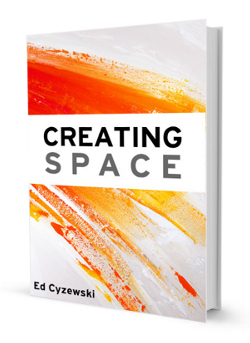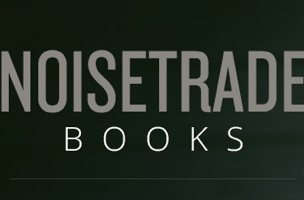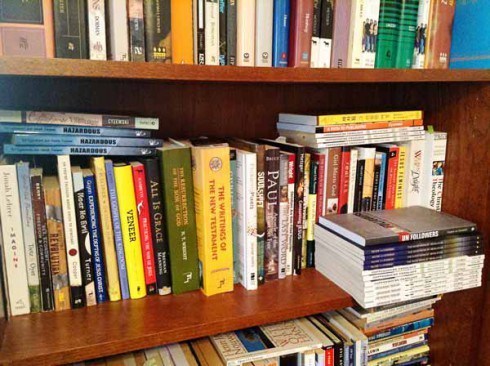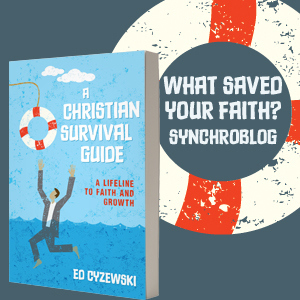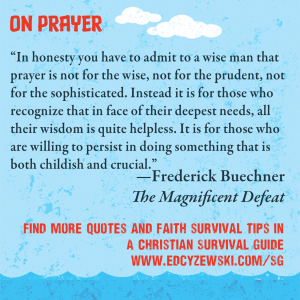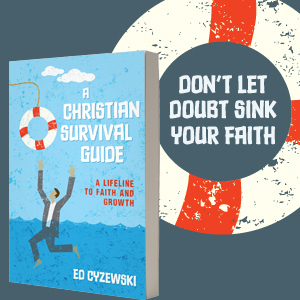Ed Cyzewski's Blog, page 30
September 22, 2014
5 Thoughts on Reading Books and Online Articles
Most writers I know spend a lot of time reading books, articles, and blog posts. Part of my process of reading books and online writing involves using a couple of different e-Reading devices, namely a Nook Simple Touch and an iPad Mini.
Becoming a user of both has helped me understand the mentality of book readers today, as well as the advantages and disadvantages of reading on these devices. It’s not that I only understand the experience of this kind of reading—I also have a better grasp of what consumers are thinking when they purchase eBooks or read websites on mobile devices.
As a writer, I value being a part of the culture that’s actively reading books and articles. Here are a few thoughts on how I keep track of current trends in my field while also picking up books for devotional and pleasure reading:
(A quick note, I have linked to the Kindle editions of a few books with my affiliate account since Amazon had them listed with pretty decent sales when I first wrote this post.)
1. Print Books Are Still Important
Can we just stop the whole, “They’ll never replace print books. There’s something about holding a book in my hands, smelling it, and feeling the pages turn…”
I get it. I get it. We are attached to the tactile experience of reading a physical. I love physical books too.
There are books I use for research or devotional reading that I really appreciate having in print. I love underlining and making notes that I can easily access later. I know that e-readers offer functionality for both, but when it comes to research or leaving important notes to myself, I never ever return to my notes and highlights in an eBook. Print, for me personally is better in those cases. I know that others have a totally different workflow that makes better use of note taking in eBooks.
However, it doesn’t make sense to write off e-readers simply based on how they feel or based on one of the many ways they can be used. E-readers are fantastic for reading novels and tablets like an iPad Mini make it easy to read blog posts and magazine articles without interrupting my workflow on my computer.
In addition, the first thing I noticed about my Nook Simple Touch was that it actually made focusing on the content of the book really, really simple. Yes, it was not the same experience as a physical book, but that didn’t mean I couldn’t appreciate the content with an e-reader in my hand.
In fact, I felt more focused on the content than ever. Having a print book with two pages open at once started to feel distracting!
2. Simple e-Readers and Tablets Are VERY Different
The experience of reading on a device devoted primarily to simply reading is far more focused and relaxing since there’s no temptation to check your email or social media. Your options are limited to the books on your device, much like reading next to a shelf full of books.
I personally prefer the focused experience of reading a book on an e-ink screen on a light weight e-reading device. I read books and articles on my iPad Mini quite a bit, but it’s still bulky (compared to my Nook) and backlit. The latest version of the simple Nook e-reader has a glow light option that you can turn on in the evening if needed.
Tablets are much better for reading online articles, blog posts, and social media updates. You can modify the e-reading apps to have black backgrounds and white text, but you still have to contend with glare during the day and eye strain if you’re already on a computer all day.
3 E-Readers Make It Easy to Read a Ton of Books
It’s not just the advantage of storing tons of books in one place or having a huge, portable library that makes e-readers ideal. Those advantages are great too. However, there’s no escaping the convenience of quickly downloading tons of books on the cheap, whether you find them discounted or free from your library.
Besides picking up bundles of classic novels for a few bucks, many new books are discounted within a year of their release. I’ve picked up some great memoirs and nonfiction books because I was able to jump on a Kindle or Nook promotion. My latest score was a discounted version of Quiet by Susan Cain.
By the way, don’t feel bad about picking up eBooks on the cheap. Publishers do these price pulses in order to raise the visibility of a book before jacking up the price again. It’s a simple way to raise the visibility of a book after its initial launch.
Between discounted eBooks and copies I can download from my local library, I have access to tons of books. Some days it almost feels like I have too much power… And if I need to pick up a book immediately at its full eBook price, usually around $9.99, the purchasing process is dangerously simple.
When I saw that several publishing experts recommended the books Your First 1,000 Copies and Let’s Get Visible, I downloaded both before my book launch and dove into them immediately, picking up critical information that I immediately put into action.
4 The Joy of Customized Reading on E-Readers
One of the first eBooks I downloaded for my new Nook Simple Touch was the New Living Translation Bible. I just wanted to sit down and read scripture for long stretches of time, and I’ve found that translation useful for that, even if I’ll use other translations for study.
I have an NLT on my shelf next to my desk. It’s huge. It’s heavy. The spine is slowly falling apart. I’m sure I could have great fun rubbing the pages in my fingers and sniffing them, but isn’t the point of reading the words on the page?
The first thing I noticed when I sat down to read on my Nook Simple Touch was how simple and stripped down the experience is. It was just me and a single column of words on the page. I enlarged the font a bit to 16 points, which, by the way, was supposed to be the standard size for all on-screen fonts before some pretentious designer thought 12 point Helvetica on a screen was more aesthetically pleasing or whatever.
5 How I Use E-Readers and Tablets
The thing that used to kill me was finding time to read books, blogs and relevant articles for either my work or personal interest, especially when I have a newborn strapped to me in an Ergo Carrier. It’s just not practical to read books when you really need a one-handed reading experience and would rather the book be as light as possible. In addition, since we co-sleep with our newborn, I need a way to read in the dark.
Enter e-readers and tablets.
Most of my books are either purchased through Nook or Kindle. I still have plenty of print books, but when I need to just read, e-readers and tablets are the way to go.
I can now use a tool like Pocket to collect articles or blog posts all day and then follow up on them later on my iPad Mini. Feedly also helps me keep track of my favorite blogs and online magazines so that I know I can follow up on an interesting post later in the day.
I use the Kindle and Nook apps on my tablet when I need to read in the dark, and I store epic book collections on my Nook Simple Touch such as the complete works of PG Wodehouse, the complete works of Mark Twain, and several Bible translations.
I can basically access everything on my iPad, but when I just want to do some dedicated book reading, I tend to prefer the simple e-ink of my Nook. It’s really easy on the eyes, and there’s no temptation to visit Facebook or Twitter if I hit a slow part of a story or get distracted from my Bible reading.
Print books are still important, but e-readers and tablets are now essential parts of my work flow and leisure reading. I suspect that will be different for folks who aren’t avid readers or authors, but there are enough advantages to both kinds of e-readers that I think they’re worth checking out.
Do you read eBooks? Which devices do you use?
Not a fan of tablets and e-readers? What are your reasons?
(Note: You’re not allowed to say, “I just like hold a physical book.”)


September 18, 2014
5 Changes in My Approach to Book Publishing
Authors all around me are giving up on book publishing, shifting to new careers, or radically rethinking how they approach publishing. Some authors, such as Phillip Yancey, are lamenting the changes to publishing and counting themselves lucky that they got in while the getting is good.
Many active authors make the bulk of their money through speaking, online courses, coaching, and more need-based, how-to projects.
The reality is that very few writers can actually survive as authors alone—especially Christian authors. I’ve seen many bestselling Christian authors who have greater success than I could ever hope for switch to corporate clients, business writing, self-help books, event planning, and the list goes on. There’s a trend where many of the people I’ve looked up to have peered ahead to the future and decided that they at least needed a better side source of financial support, if not an altogether different career.
I’ve been thinking long and hard about the path of my career. At one point I tried to supplement book publishing with magazine writing. I’ve also tried to play the traditional author game by landing speaking gigs. Both have their advantages for other people, but I can see that neither are a particularly good fit for me, especially at this season in my life.
Having commercially published five books and self-published several short projects and one full-length book, I’m also rethinking my path as an author, but not quite like them. I’d like to share five shifts I’m making in order to help other authors consider their own futures and, let’s be honest here, to hold myself accountable.
1. I’m Writing Books. Period.
I’ve spent too much time dividing myself over too many different kinds of projects. I’d been trying to write for magazines and very particular websites that called for a specific kind of short-form writing and I’m simply terrible at it.
I’m sticking with this blog, my newsletter, my book projects, and some select freelancing projects. I used to really fret about getting magazine credits and invested so much time in pitching article ideas that were either shot down on the spot or written on spec before being shot down. The few articles that did make it into publication brought very little by way of return for my publishing career.
I’m not saying that other people can’t or shouldn’t do that. I just know I’ve tried really hard to make it work, and I’m not seeing any kind of meaningful return. I’d much rather write eBooks, something I know how to do, and give them away in exchange for email addresses or sell them for a discounted price—which adds up if you can sell enough eBooks.
2. It’s All about Email
Writers write for an audience, right?
Right.
I used to divide my attention between writing for an audience and writing to get noticed by publishers—hence my wasted time trying to write for magazines when I really had no business doing that.
There’s a simple, tried and true way to build relationships with readers on your own terms that every book marketing expert praises: email. And here’s the thing, I love jotting down little notes to my e-newsletter readers, keeping them in the loop on projects, and sending them free books whenever I can.
It’s like having a secret club.
So my publishing plan is something like this:
Write for my blog regularly, testing out book ideas and collecting new email subscribers.
Send updates, recommendations, and new books to email subscribers.
Publish and self-publish books, asking my newsletter readers to help spread the word.
Then I’ll start posting new ideas on my blog and begin the process again.
3. I’m Crossing Genres, Not Topics.
It made sense to write my Path to Publishing book in 2010. It helped me land publishing workshop gigs. It also saved me a ton of time writing emails to people asking first-time publishing questions. I wouldn’t say it’s made a ton of money, but it at least paid for itself.
However, I’m not interested in becoming a publishing guru as so many authors have done. I’m more interested in publishing books related to religion and then sharing what I’ve learned about publishing along the way. I see A Path to Publishing as a departure from my central writing topic: religion.
Having said that, I am finally taking fiction seriously. I’ve dabbled in fiction on and off over the years, always scrapping novels at the halfway point because I just wanted to run the main character over with a bus. I finally have an idea for a series that is exciting and strikes me as sustainable for the long term.
The novel I’m working on has a main character who is a Christian and he’ll be interacting with Christian stuff, but there’s no single moralistic lesson or point to the book beyond telling a good story. So I’m sticking to religion as my topic, but I’ll keep writing nonfiction while adding some fiction to the mix.
4. I’m Committing to a Hybrid Approach… for Now
There was a time when I saw the amount of work required to go indie as an author, and I rightly decided that it was simply too time-consuming.
Now there are better tools and better methods available. It’s far more viable for authors to self-publish today. I also have way more experience with publishing, so I should, in theory, be able to write books that require less editing than if I’d started self-publishing full time in 2010. I’ve already dabbled in self-publishing for a few book projects as a kind of experiment. I was hesitant to jump in with both feet until I had a better grasp of what it took to be successful—not I have a “great” grasp, just a better grasp.
I’m not giving up on commercial publishing. I’m simply becoming more intentional about both.
I have a list of publishers in mind for my projects, and if I can’t work with the right publisher(s) for the right project, I’ll either drop it or self-publish it.
I’m also intentionally developing a series of eBooks that I can self-publish.
5. I’m Selectively Publishing
I admit that I saw a publisher as a way to legitimize myself. Perhaps I still do. I’m not sure I would strike out into self-publishing without a few commercial books that at least turned a few heads.
I used to think that publishers validate you. I was wrong. Readers validate you. If readers want your books, then you’re valid.
I heard an agent talking about that bestselling book Heaven Is for Real. Someone insightfully asked him if he would have represented the author. He laughed and said, “Well, I’d represent him now!” Exactly, as long as Burpo is selling books to people, he’s a valid author.
Validating yourself as an author is really just a matter of connecting with readers. That’s it.
Today I see publishers as partners who should help you do two things:
Improve your book.
Reach more readers.
While authors understand that the best editors should improve the content of a book, most fail to fully grasp just how much rests with the author for book promotion. A publisher can do a lot. They can buy some ads, print marketing materials, organize price promotions, create graphics, send copies to reviewers, advocate for authors with book buyers, and promote books to their mailing lists, but none of those tactics are necessarily guarantee sales.
Few authors are prepared to successfully convince people to buy their books. I’ve also learned that publicists at a variety of publishers are divided in their opinions on how to release a new book, which is a whole other post.
In some cases a savvy publicist makes all of the difference in the sale of a book, in some cases the publicist holds back an author who has innovative ideas, and in other cases the book is DOA regardless of what a publicist or author does. I’ve talked to authors who have been all across the spectrum on this.
So that’s it. I’m going to keep publishing books. I’m not here to get cover stories on magazines, to be the headliner at a conference, or to change the course of evangelical Christianity for the next 50 years or whatever. I have some stories to tell, some ideas to share, and an itch in my fingers to write.
I have books to write, blog posts to draft, and emails to send. If you want to keep in touch throughout this journey, pick up my new books, learn from my mistakes, and get some off the record thoughts on it all, sign up for my e-newsletter. You’ll also receive two free eBooks!


September 16, 2014
3 Reasons We Neglect Personal Maintenance
Without maintenance a home, bike, or car can be damaged, slowed down, or completely disabled.
While we can see the ways that objects need maintenance, it’s easy to forget that we need “maintenance” for ourselves, our relationships, and our work. It’s tempting to rush from one thing to another without reflecting on how we’re doing, where we’re going, and if we even want to go to there. A little bit of maintenance time helps us take stock of these things so that we can live a bit more intentionally and healthily.
Maintenance could be reading a book, having a conversation, relaxing on the porch with a drink, taking a quiet walk, praying, or journaling. Different practices will come in handy for various seasons of our lives, but we never lose the constant need for reflection and adjustments.
There are three main big reasons why we neglect maintenance time and risk breaking down personally/spiritually, relationally, and professionally:
The Pride of Being Busy
Stopping feels wrong, especially when we see ourselves as critical to our own success. In addition, we’re surrounded by people who are busy as well. Rest isn’t exactly a cultural priority, and we can easily turn that into our baseline expectation for life—assuming that not being busy is a problem.
We tell ourselves that we’ll run out of money, the household will fall apart, or we’ll fall too far behind if we stop to take stock of ourselves and make some adjustments. It’s all up to us, and that breeds a frantic lifestyle that fails to live by faith, fails to value Sabbath, and feeds anxiety.
Take a social media break. Take some time off from work or household chores—even 30 straight minutes will help. Just stop long enough to see that the world won’t fall apart if you stop.
We Forget What Stillness Feels Like
I used to listen to the news in the car, play podcasts while walking and doing the dishes, and browse the Internet while sitting in the living room. I didn’t have much time left to pray, talk to others, think, or read books.
The constant consumption of information and need for stimulation becomes an addiction. It used to be really, really hard for me to take a walk without a podcast or music on. I used to crave the news while taking even the shortest car trip.
Thankfully, we can train ourselves to value stillness and quiet. When I take a quiet walk these days, my worries have time to bubble to the surface so that I can think them over and pray about them. Some of my best writing ideas have surfaced during quiet walks—even when I’m interrupted by a toddler begging to stop and look at the waterfall.
We Fail to Understand Diminishing Returns
Four years ago I read a book by an entrepreneur who said that we should work 12 hours or more each day to make a big project happen. There are tons of hours in a day, right? You can sacrifice sleep, food, relationships, and exercise for the sake of sake of a big project, right?
Well, I tried it. Perhaps some people can do that to launch a business, but creative people can’t. We only have so many words, so much energy, and so many hours in a day. That season of pushing harder and harder brought few serious returns for my effort because I was exhausted, stressed, and had neglected personal and professional development.
I had tried to work 10-12 hour days and completely wore myself out. I’m better at recognizing this exhaustion now. I rarely try to work on anything in the evening because I’m too tired and tapped out to be effective.
If there’s a pressing deadline, I’m always better off going to bed on the earlier end and trying to wake up earlier. Or, more realistically, I just call it a day and begin my next work day as usual, recognizing that I can’t push forever.
We have limits. Pushing for a short time may help launch a project or wrap up something with a tight deadline, but our work, personal lives, and spiritual lives will suffer if we keep pushing.
* * *
We’ve been in a season of maintenance after a busy series of months with travel, childbirth, and book projects. I feel like we’re still recovering and trying to carve out more space for family and for ourselves.
I’m trying to faithfully read some books and blogs that will help me take my next steps in my writing career. I’m trying to savor my walks with the kids and any moments we can quietly play in the living room or we can all sit on the porch as a family and hang out. That’s maintenance for me right now.
Where are you at with the idea of maintenance?
Do you feel like you need a bit of maintenance time in a particular area of your life?
What would a bit of maintenance look like for you right now?
Need a bit of inspiration for your next creative project?
Check out my eBook Creating Space: The Case for Everyday Creativity.


September 10, 2014
Is NoiseTrade Books a Viable Book Marketing Tool? A Guest Post
I’m guest posting today for one of my favorite publishing experts: Jane Friedman, a former Writer’s Digest editor and current social media professor and founder of Scratch Magazine, a new publication for artists and writers. This post is a bit of a departure from my usual stuff, but if you’re one of the many people who ask me about how to market a book, you may want to check out how I’m connecting my books with new readers:
In 2012 I was in-between book projects, and I had an idea for a short eBook on creativity, so I decided on a whim to write it, put a cover together with a high quality image, and release it for free during a 3-day KDP select offer. I even guest posted on this blog about it.
Thanks to several generous shares of the eBook by folks like Joanna Penn and the momentum of the Kindle bestseller lists, Creating Space landed on the “Creativity” and “Writing” bestseller lists (which, by the way, used to be listed next to the paid bestseller list) and spent a two days in the Kindle top 100 free eBooks. About 4,800 readers downloaded the eBook in three days (I didn’t know then that I should have probably used all five days at once).
After the promotion, I kept the price at $.99 since it’s short, and readers kept downloading it, typically noting its brevity as a virtue in reviews. However, I couldn’t stop thinking about those 4,800 downloads. Despite my ads and author information in the back of the book, I still didn’t have any way to contact any of those readers again.
While authors have successfully used free promotions to sell other books or to gain temporary exposure on bestseller lists (see Let’s Get Visible for more on that), I really wanted to find a way to offer at least a few of my books in a “pay what you want” model that relies on collecting email addresses as the primary form of payment.
That model existed—it just didn’t offer eBooks.
Read the Rest at www.janefriedman.com.


September 9, 2014
Publishing a Book Is Not NEAT
In case you were wondering, publishing a book is not “neat” in any sense of the word.
Writing a book is messy.
Writing a book is demanding.
Writing a book is heartbreaking.
Writing a book demands sacrifices of yourself and everyone close to you.
Writing a book will drain you, punch you in the gut, and then kick you while you’re down.
When you finally hold that book in your hands after years of fighting, chopping, and spilling your heart onto the page, it will be surreal. It will be amazing. You’ll also think something like, “Well, it’s about damn time.” And then you’ll go take a nap or collapse onto the couch to sob a little… and then take a nap.
I outlined my publishing journey in my book A Path to Publishing (download the whole book for free), and the most common response I hear from readers is despair. When I walk new authors through the book marketing process, many of them just want to crawl into the fetal position.
And I haven’t even mentioned the absolute worst part of book publishing. And no, it’s not a bad review.
The worst part about publishing is the staggering indifference of most readers to your work.
Marketing a carefully crafted book is draining and demanding, but few may read it no matter how hard you try to spread the word. Remember, J.K. Rowling published a book under a pen name, and it hardly sold any copies. This is someone who has penned enduring bestsellers that have defined an entire generation of young readers, and she couldn’t even rack up a few thousand readers when using a different name.
Do you have any idea how daunting that is?
All of this is profoundly NOT NEAT.
* * *
I do a lot of author coaching both formally and informally, and I often refer new authors to my Path to Publishing book and encourage them to write with questions about the next step. If they can’t even finish the book, then they’re clearly not determined enough to publish a book—they probably just think publishing is “neat” until you read about the demands of the step-by-step process.
The people who will succeed in book publishing cannot go into it because they think it’s neat. They need a stronger driving force to carry them through all of the politics, discouragement, and exhaustion.
Writing a book has to be an unstoppable mission or a haunting presence that you can’t shake. You have to find yourself scribbling down ideas, dreaming of book covers, and imagining what your readers want.
I would go so far as saying that it’s like the words bottled up in the prophet Jeremiah that were a fire in his bones. If he didn’t let them out, they would have consumed him.
Authors must be driven write. There’s something inside of us that we simply can’t switch off. And perhaps we’ll still say that publishing a book would be neat, but deep down it must be more than. It must be a driving passion.
* * *
When I talk to friends about book publishing and I learn that one of them is considering it, I often say something like this, “I’ll help you, but I also want to spare you from pain. This is going to hurt.”
The pain of publishing is one of the most common reflections I’ve heard from fellow writers. It… just… hurts. That isn’t to say that it’s bad to have that pain. You just need to really want that finished book project if you’re going to endure that kind of pain.
The most worthy goals in life often call us to the greatest pain.
In the Christian faith we talk about the cost of discipleship, laying our lives down for the cause of Christ. If you feel a calling or desire to write, there will be a sacrifice and it will hurt, but there are certainly rewards if you can fight past the pain.
In fact, I would even say that we can even resist some of the pain in publishing. We can choose to ignore which influencers or friends have ignored our book. We can stop comparing our success to other authors.
Instead, we can look at the people whose lives have been changed by our work.
We can be grateful that we finally breathed these words of fire onto the page and they didn’t consume us.
We can be grateful that we’ve created something that could outlive us.
We can be grateful that we’ve persevered and accomplished something that only a small group of people are willing to endure.
Book publishing is not for everyone. In fact, even with the ease of self-publishing, there are lots of people who should focus on other creative outlets, such as podcasting, creating short videos, or blogging. A book can effectively communicate ideas to a lot of people, but it’s not the only way to reach a large group of people with ideas or stories.
Writing and publishing several books has been the most meaningful work I’ve done. If I had a few days, weeks, or months left to live, I’d keep publishing. It’s the best kind of challenge I can imagine. It results in something I’m proud of.
As much as I love it, I can assure you that publishing a book is not “neat.”


August 29, 2014
An Invitation to Spy on My Bookshelves
I have the honor of contributing to the guest series “Other People’s Bookshelves” over at Anne Bogel’s blog, Modern Mrs. Darcy. Anne is a talented writer who manages to read a ton of books, which she shares in her epic Summer Reading Guides each year, and who wrote one of the must-read books on time management, productivity and creativity.
In this post I share the books that are most important to me, what we read for fun, and why I used to hide my theology books.
Check out my bookshelves at Anne’s blog.
August 25, 2014
What Saved Your Faith? Highlights from the Synchroblog
Last week I asked “What Saved Your Faith?” as part of the release celebration for A Christian Survival Guide. I was overwhelmed with the honest, beautiful stories of faith that felt on the brink and was saved. There are so many different ways that your faith can be saved, and I’m grateful that so many participated and shared with the Twitter hashtag #savedmyfaith.
I’m going to take the next week off from blogging in order to catch up on some things I had to put on the back burner, but I first wanted to share a round up of the posts along with some of my favorite quotes:
“In the middle of the night, our church was that stairwell; our hymns, an improvised jumble of notes and rhythms that spoke of longing, of peace, of joy. We shared our hearts with one another in a way that was sacred. In the midst of the questions surrounding my faith during my college years, I found holiness in the music of a dirty hallway.”
“When freedom is as evident as it’s ever been and God’s presence breaks through the thin places again and again, yet I still struggle with occasional (though less frequent, praise God!) worries about my kids or fears about new adventures, God reminds me through songs to keep focusing on him, keep showing up to love, and keeping praising through everything.”
“Grief and loss and the iffy decisions that I made in that dark hour led me far, led me to push hard against the edges of my faith to see what would break away and what would stand. And all that while, when I battered away at the false promises of ease and lifelong marriage, as the accusations about divorce and celibacy lobbed from without and within, that love held my core tight and firm, reminding me in groans I could neither utter or hear that I was profoundly and deeply loved by One who is love.”
“As the new and clueless mother of infants who cried and demanded things in a language I didn’t know, my faith was stretched like a breaking rubber band. I remember stretching out on the carpet of my bedroom while one or two wailed, praying for peace, and knowledge and creativity, and energy. I remember rising from that carpet, tears on my face and carpet impressions, too, walking with a supernatural calm to ease their discomfort, to fulfill their needs, to be the mom I had to be, wanted to be.”
“While the timing of past events has become very fuzzy to me, there is one moment I do remember, although I do not remember when or where it occurred. I was at a point where I thought I would have to make a decision to give it all up. Faith, church, Jesus. And as I contemplated what to do, I realized it could go either way. I didn’t know anymore who Jesus was or what he was supposed to mean to me. It was as if I was facing two paths to walk down, and I had to choose one.”
“Ultimately I don’t believe it is my faith in God that keeps me going, it is his commitment to love me and be at work within me that endures in good times and in bad. He saves the faith he planted in me whenever it is threatened by times of darkness, disaster or drought. ”
“I’ve been on the edge of giving up. Weary of rituals. Weary of people equating my questions with a lack of faith. Weary of people using the first chapter of 1 Corinthians to persuade me to stop digging deeper. Weary of people telling me to “just believe.” Weary of people in general.
Then there are people that God uses in tremendous ways.
Every person that listens to my story and my struggles and says, “me too.”
Every person that listens to me recount the ups and downs of my day to day existence with even a hint of love and empathy in their eyes.”
Christian on the Frontline“These “heretics” have quite literally saved my faith and my relationship with Christ. They blew wide open the questions and dared to go down roads many deemed too dangerous. Anytime I find someone branded a heretic by a Christian, it encourages me to go read their work. ”
“Because when The Gray emerges, when it overwhelms and frightens and clouds our stories, it also sometimes forces us to huddle under cozy blankets and stare out cloudy windows and just be. We become lost in a tangle of unknowing and we question God, hurling insults at him and raising questions towards him, one after another after another, like the ball pitching machine in the batting cages. Whoosh! Whoosh! Whoosh! Our hands lob and they sling and they fire fastballs towards the Great One, wondering if this’ll be the last time he’ll lend ear to our third-degree queries. For somehow, in this insult-throwing, not-knowing, time-of-questioning period of gray, I’ve felt the most certitude.”
“Sometimes I was the only one at the altar, but it made no difference. Through my tears, God taught me deeper lessons about faith. And sharing our story with loved ones. I walked away from this time knowing one’s salvation truly rests in Christ alone.”
“It took me a full decade to grasp what God was doing. He was stripping me of my legalism, arrogance, and self-reliance. He was transforming me to rely on him, so he could show me that his promises are really true and I could learn to love him. It wasn’t about me and my capabilities, but about Christ and his cross.”
“You see, I want all of the beauty. I want the irreverent, gritty honesty out there AND the deeply mystical prayers in here. I want the pragmatic, scientific solutions for the world’s problems out there AND the earnest faith for the impossible in here. I want the big, huge tent that welcomes everyone out there AND the narrow road of life giving sacrifice in here. I want to glean the wisdom of the world AND own Jesus’ beautiful vision. I want to be a Christian, but not THAT kind of Christian.”
“I’ve long turned to books for answers and solidarity. In spite of this new section, I wasn’t hoping for much when I asked Andy for recommendations. He didn’t hesitate before placing A New Kind of Christian in my hands. It had been published almost a year earlier and when he described its impact on him, I immediately sensed it would have the same effect on me.”
“Not only is God not made of dust, He is capable of making me from dust, and you. He creates something—everything—from practically nothing. He takes ruined things and makes them whole and valuable again. But he remembers, always, that I am not more. I am just dust.”
“Learning to pray prayers formed from my own words, out of the contents of my own heart transformed my faith. Listening to the honest prayers of my fellow congregants served as an invitation into something richer than I ever imagined–real conversational prayer with Jesus.”
“When I am struggling in my faith I am particularly glad for corporate worship and liturgy in particular. Even if I can’t pray, the community of faith carries me through their prayers. Churches who do liturgical worship are accused sometimes of “just going through the motions.” I have to tell you though, when infertility plunged me to my lowest point, those “motions” were all I had. Reciting liturgy that I have memorized, that I know by heart allowed me to pray when I would not have otherwise been able to pray.”
Interviews
Jennifer Clark Tinker at Life & Liberty
“The book had me laughing out loud and reading passages to bystanders, while also giving me wisdom to continue to ponder in my heart.”
Trip Kimball
A Few Reviews…
“If you are being challenged in an area of Christian belief, take a look at this book. There just may be a biblical perspective you have not considered that will help you survive with your faith intact. Above all, rely on the Holy Spirit to sustain you and keep you focused on Jesus.”
“Every year, almost like clockwork, our students who are in 11th grade suffer some sort of crisis of faith. It’s something that we’re looking at pretty hard, trying to research and discover where this phenomenon comes from. But in the meantime, as I was reading Ed’s Christian Survival Guide, I knew that I would be purchasing several more copies, and handing them out to students when these crises of faith arise. I would highly recommend youth pastors of all walks of life buy a batch of these books to have on hand to give to your students. You’ll be glad you did.”
“A Christian Survival Guide lays things out in a methodical and logical way, but it also leaves some wiggle room. Rather than having an air of authority and arrival or one of pure confusion and questioning, Ed’s tone is one of the best I’ve seen in terms of opening a conversation. He shares his own experiences and thoughts, he provides Biblical backing when he can, he offers perspectives from lots of different Christian traditions, and he is soft and gentle on things that could get confusing. In short, he makes me think.”
* * *
I appreciate everyone who posted a review, picked up a copy of the book, shared about it on social media, and helped spread the word. This has been a labor of love for me over the past four years, so it means the world to me that you’ve helped tell others about it.
I’ll be back to the blog in a week or so.
Gratefully,
Ed


August 22, 2014
Revelation and God’s Place in an Unjust World
I have the honor of writing for Red Letter Christians today, which is one of my favorite blogs, about the role that the book of Revelation should be playing as we try to figure out God’s place in a violent, unjust world. Hint: It’s not here to help us spot a future “Anti-Christ” figure…
Injustice appears to be the main thread running through the news these days.
Systemic racism has been exposed when a police officer, according to all eyewitness accounts, murdered an unarmed African American teenager.
Islamic State militants have killed religious minorities in Iraq and continue to threaten thousands upon thousands of Christians.
Violence could erupt again at any moment in Gaza.
These national and international events are but a cross section of disturbing news in our world that range from persecuted Christians in China to the staggering number of African Americans who are locked up for longer prison sentences than whites.
Who could fault anyone for asking, Where is God in the midst of injustice and persecution?
The writers of scripture give us a compelling answer to this question, but many Christians today–especially Christians in the West–have missed it. That is because the Bible, in part, deals with our questions about God’s place in an unjust world through the book of Revelation—a book that many have tragically (and, at times, comically) misunderstood.
Read the rest at Red Letter Christians.


August 21, 2014
When Prayer Is a Still Small Voice for Big Loud Problems: A Post for Preston Yancey
A few weeks ago the upcoming memoir Tables in the Wilderness by Preston Yancey arrived on my doorstep. I started to casually read it. He’s a twenty-something writer who likes to cook and hang out with icons. I didn’t quite know what to expect. While I haven’t finished it yet, I’ve been completely delighted by his story and his masterful writing, and I highly recommend preordering it today.
Preston is also a passionate blogger who has kindly shared his blog, hosting me for a guest post adapting A Christian Survival Guide’s chapter about prayer.
Did you know that Jesus spent significant amounts of time praying? He regularly took trips into the wilderness and up mountains to pray for extended periods of time. It’s not exactly a hidden aspect of his ministry. It’s just one that I didn’t think about too much until recently.
Have you ever wondered why Jesus prayed so often?
Wasn’t Jesus already pretty tight with God since he was a member of the Trinity? The fact that he took time to pray is a Trinitarian brain bender. Wasn’t he still God?
If Jesus made prayer an integral part of his life, what makes us think we can do any better without it? If anything, Jesus sent us a very important message about the practice and importance of prayer. Our survival as followers of Jesus depends on it. If our Lord modeled prayer for us, then we’d better figure out a place for it in our lives.
Many Christians I know today, myself included, struggle with a condition I call “prayer guilt.” We all like to pray. We all see the value of prayer. We even pray most days. However, we always feel like we never pray enough. If we have prayed, we didn’t pray long enough or failed to stay focused while praying. I’ll even tell myself, “Sure I prayed, but the prayers weren’t very good.” It would be nice to at least have a vision or speak in a tongue or two before checking prayer off my “to do” list.
I’ve spent far too many days living with an underlying sense that I should be praying more or doing more for God. I can always think of someone who must be meditating longer, reciting prayers that are more ancient, or lighting taller, brighter candles. Whether or not I’m correct, that guilt leaves me feeling inadequate and unable to approach God with the kind of confidence that Jesus talks about.
Read the rest at Preston’s blog.


August 20, 2014
When I Was Ashamed of the Gospel: A Guest Post for Micah J. Murray
Micah J. Murray is one of the most talented young writers I know. His blog Redemption Pictures is a must read each week. However, he does a lot more than blogging. He produces videos, designs websites, and, in his latest venture, designs t-shirts based on his most popular posts. I’m especially fond of this one:
Micah was kind enough to share his blog with me so that I can post an adapted version of the Survival Guide’s chapter on sharing the Gospel: “Death of a Sales Pitch?” Maybe you can relate to feeling like you’re ashamed of the gospel if you aren’t out there sharing it all of the time…
When I realized I was ashamed of the gospel, I feared losing my salvation.
I’ve been told that REAL Christians share their faith and aren’t ashamed of the gospel. In fact, I’ve been told that if I didn’t share my faith at EVERY opportunity, I’m actually ashamed of the Gospel and Jesus would deny me (Matthew 10:33).
Talking to strangers is pretty much the last thing an introvert like me wants to do, but when an evangelism class in seminary required that I share my faith ten times every week, I finally had a crisis of faith and sanity.
I had constant anxiety attacks about evangelism . . . even while shopping . . . at Wal-Mart.
We could make ourselves insane with evangelism.
If every person is an eternal soul who could end up in hell suffering for the rest of eternity, shouldn’t we walk from person to person every minute of every day asking them if they know Jesus?
Read the Rest at Micah’s blog: Redemption Pictures.







